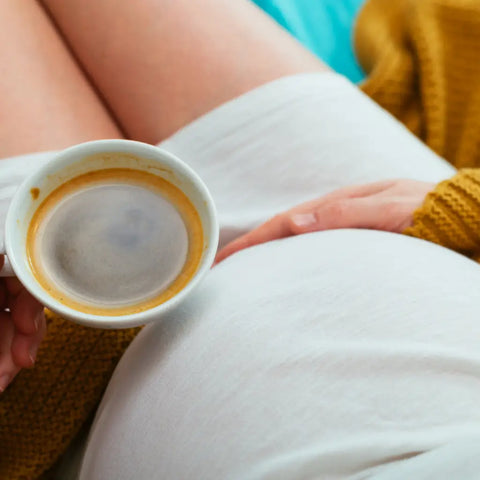Giving up coffee during pregnancy can be difficult for lovers of this beverage. While caffeine is not recommended for pregnant women, what about decaffeinated coffee? This alternative seems safer, but is it truly risk-free for you and your baby? With various decaffeination methods, recommended quantities, and precautions to consider, it’s not always easy to navigate. Discover this complete guide on consuming decaf coffee during pregnancy to make the best choice with peace of mind.
Decaf coffee during pregnancy: what you need to know
Yes, you can drink decaf coffee during your pregnancy, but in moderation. Unlike regular filter coffee, which contains between 70 and 140 mg of caffeine per cup, decaf contains only 2 to 5 mg. This significant difference makes it a viable alternative for pregnant women.
Decaf coffee is made by extracting caffeine from green coffee beans before roasting, using methods such as hot water, carbon dioxide, or natural solvents. This process preserves the taste while removing nearly all the caffeine.
Recommendations for expecting mothers
The official recommendation from the World Health Organization: limit yourself to a maximum of 1 cup of decaf coffee per day during pregnancy. This amount lets you enjoy the pleasure of coffee without exposing your baby to the undesirable effects of caffeine during pregnancy.
Important: If you have a high-risk pregnancy (high blood pressure, gestational diabetes, history of miscarriage), it’s essential to consult a healthcare professional before consuming decaf coffee during pregnancy. In some cases, complete abstinence may be advised to avoid any additional risk.
Don’t forget to account for other sources of caffeine in your daily diet (tea also contains caffeine, as does chocolate and soft drinks) to stay within the overall 200 mg daily caffeine limit recommended by Health Canada for pregnant women.
Benefits of decaf coffee for pregnant women
Despite the absence of caffeine, decaf coffee offers many benefits that suit the needs of pregnancy:
Rich in antioxidants and nutritional support
• Rich in antioxidants: Polyphenols and chlorogenic acids help combat oxidative stress, protecting your cells and your baby’s from free radicals and promoting healthy development.
• Blood sugar regulation: Active compounds help stabilize blood sugar levels, reducing the risk of gestational diabetes and cravings, especially in the first trimester.
• Anti-inflammatory properties: Antioxidants reduce inflammation and help relieve joint pain, which is common during pregnancy.
Cognitive and digestive support
• Cognitive support: Neuroprotective elements help maintain focus and memory, naturally compensating for “baby brain” without stimulating the nervous system.
• Better digestive tolerance: Less acidic than regular coffee, it helps limit morning sickness and acid reflux, which are common in early pregnancy.
Risks and precautions of drinking decaf while pregnant
Although safer, decaf coffee still comes with some risks that should be considered for informed consumption.
Digestive issues and reflux
Decaf coffee is naturally acidic (pH 4.85–5.10) and contains irritating tannins. During pregnancy, the growing uterus compresses the stomach and slows digestion, worsening acid reflux. Essential oils in coffee can also stimulate acid production, increasing nausea and heartburn—especially in the morning during the first trimester.
Effects on the mother’s cardiovascular system
Residual compounds from processing can slightly affect blood pressure and heart rate. Unlike standard arabica coffee, which significantly increases heart rate, decaf has minor effects but is still not recommended in cases of pregnancy-induced hypertension or preexisting heart conditions.
Potential drug interactions
Decaf coffee may interfere with iron absorption, which is vital during pregnancy, and affect the efficacy of certain supplements. It can also interact with anti-nausea medication or antacids. Always consult your healthcare provider before combining decaf coffee with medications to avoid harmful interactions.
How much decaf coffee can you drink while pregnant?
Golden rule: no more than one 125 ml cup of decaf coffee per day. This recommendation is based on EFSA data that sets the caffeine limit during pregnancy at 200 mg per day. With only 2 to 5 mg of caffeine per cup, decaf leaves comfortable room for other sources.
Hidden sources of caffeine to limit
Be cautious with foods that contain caffeine! One cup of black tea (40–50 mg), dark chocolate (12 mg per 30g), Coca-Cola (35 mg), or even some headache medications contain caffeine. Add up your daily intake to stay under the 200 mg threshold and avoid overconsumption.
Caffeine content comparison table
| Beverage | Caffeine per cup (125 ml) |
|---|---|
| Decaf coffee | 2–5 mg |
| Espresso | 70–140 mg |
| Instant coffee | 60–80 mg |
| Black tea | 40–50 mg |
| Green tea | 25–30 mg |
| Hot chocolate | 4 mg |
| Coca-Cola (250 ml) | 25–35 mg |
At Chronic., we favor the Swiss Water Process. The result: a 100% natural decaf with no chemical residues. This method preserves the aroma while ensuring full caffeine extraction—just what you need during this precious time.
Decaf coffee and breastfeeding
Great news for moms: decaf coffee offers more flexibility during breastfeeding! According to the American Journal of Clinical Nutrition, only 0.06% to 1.5% of consumed caffeine passes into breast milk. EFSA allows up to 200 mg of caffeine per day—so 2–3 cups of decaf pose no problem.
Timing and monitoring are key
Timing matters: caffeine peaks in breast milk 1 to 2 hours after consumption. If your baby is particularly sensitive, drink your coffee right after a feeding to minimize exposure at the next session.
Be cautious with premature infants or babies under 6 months, whose immature metabolism processes caffeine more slowly. Watch for irritability, sleep disturbances, or unusual restlessness.
Alternatives to decaf coffee
If even decaf coffee doesn’t suit you, here are some flavorful and comforting alternatives:
Naturally caffeine-free drinks
• Grain-based beverages: Chicory, roasted barley, or grain blends offer a similar bitterness to coffee with no caffeine at all. These warm options maintain your morning ritual.
• Suitable herbal teas: Rooibos (naturally decaf), chamomile, or ginger tea offer comfort and digestive benefits. Limit to 2–3 cups per day during pregnancy.
• Spelt or lupin coffee: These plant-based substitutes closely mimic the taste of coffee while providing fiber and minerals beneficial for nutrition.
Natural energy boosters
• Golden latte: Turmeric, plant milk, and spices create a comforting anti-inflammatory drink—perfect for replacing your morning coffee.
• Fruit infusions: Fruit infusions offer a wide variety of caffeine-free flavors, ideal for hydration throughout the day.
Professional tip: Avoid herbs like ginseng or certain energy drinks during pregnancy. If in doubt, consult your healthcare provider for personalized advice based on your health and condition.
The key is to listen to your body and adapt your choices to your personal sensitivities. Every pregnancy and breastfeeding journey is unique—what matters most is finding your balance while keeping your baby safe.






